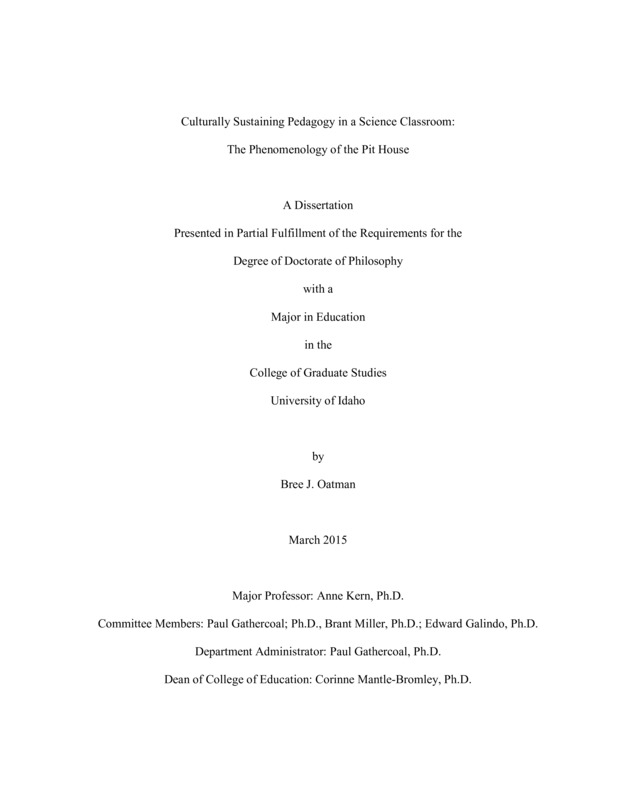Culturally Sustaining Pedagogy in a Science Classroom: The Phenomenology of the Pit House
Oatman, Bree Justine. (2015). Culturally Sustaining Pedagogy in a Science Classroom: The Phenomenology of the Pit House. Theses and Dissertations Collection, University of Idaho Library Digital Collections. https://www.lib.uidaho.edu/digital/etd/items/oatman_idaho_0089e_10522.html
- Title:
- Culturally Sustaining Pedagogy in a Science Classroom: The Phenomenology of the Pit House
- Author:
- Oatman, Bree Justine
- Date:
- 2015
- Embargo Remove Date:
- 2016-06-15
- Keywords:
- American Indian education culturally sustaining pedagogy curriculum development physical science science education
- Program:
- Curriculum & Instruction
- Subject Category:
- Science education
- Abstract:
-
American Indian students often experience a dissonance between their own worldview and Western Modern Science (WMS). This tension between their cultural understanding of how the world works and what is taught in the classroom can create barriers to learning. Institutionalized racism and historic education policies and practices designed to assimilate American Indian students have contributed to the marginalization of American Indian students in traditional classrooms. This phenomenological study examined the affordances offered in a science classroom, when a culturally sustaining pedagogy (CSP) was used to teach physical science, biology and environmental science concepts. CSP is a framework for instruction that creates an environment where trust is established and student worldviews are honored enabling teachers and students to examine the role of race and social inequity in the learning process. This study provides an overview of a curriculum that teaches WMS concepts using CSP with a pit house (subterranean earth lodge) as the focal point for learning. The study examines the lived experiences of six purposefully selected American Indian high school students, discussing the practical and theoretical implications for CSP through the lens of Critical Race Theory (CRT) and Tribal Critical Theory (TribalCrit). Methods used in this study included interviews, sacred mapping, journaling and sharing circles. The study gives voice to the student experiences as well as shedding light on the role of the teacher (author of the study) as a facilitator for creating a culturally sustaining learning environment. Several themes emerged from the interviews including connection to community and family, the politics of identity and racism in school, and agency/self-efficacy in science. The results of this study indicate that CSP is a useful tool for creating a space for learning where student identity and cultural expression are valued. The conclusion discusses the practical and theoretical significance of the study particularly regarding teacher behaviors and interconnections between race, racism, identity and sense of efficacy in science. In addition, the study provides implications for other classrooms or communities wanting to develop culturally sustaining curriculum.
- Description:
- doctoral, Ph.D., Curriculum & Instruction -- University of Idaho - College of Graduate Studies, 2015
- Major Professor:
- Kern, Anne L
- Committee:
- Gathercoal, Paul; Miller, Brant; Galindo, Edward
- Defense Date:
- 2015
- Identifier:
- Oatman_idaho_0089E_10522
- Type:
- Text
- Format Original:
- Format:
- application/pdf
- Rights:
- In Copyright - Educational Use Permitted. For more information, please contact University of Idaho Library Special Collections and Archives Department at libspec@uidaho.edu.
- Standardized Rights:
- http://rightsstatements.org/vocab/InC-EDU/1.0/

